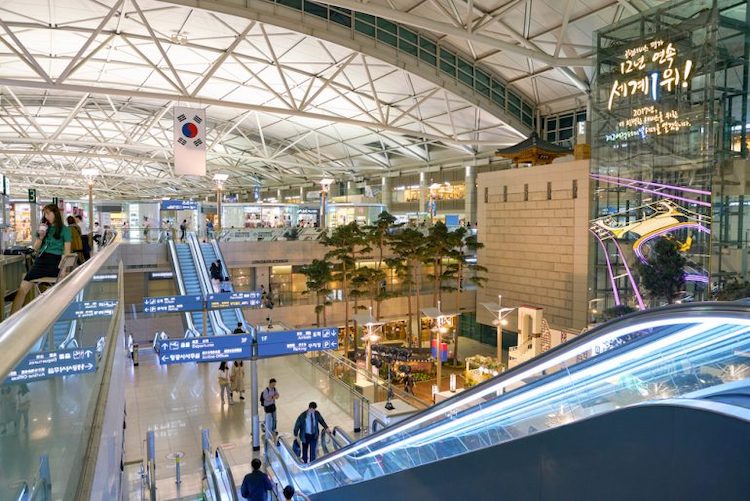I’ve had my fill of both airports and hospitals over the past few weeks. The airport, because I’ve had the joy of picking up (and dropping off one of) my children and their families. The hospital because I’ve had the anxiety of waiting out my wife’s surgery.

The airport is filled with thousands of people – coming, going, waiting. In Korea, I’m constantly surprised at how good some people look getting off a 15-hour flight from the other side of the world. And on the other end, it’s interesting to see so many who come to meet their loved ones, going to great lengths to look so nice for them.
The airport is such an interesting place to watch people. Every time I go, my imagination is opened up in wondering at who they are and where they’re going or the places from which they’ve come. Not so much here in Korea (where so many people have typical Asian characteristics), but elsewhere, I’ve seen such a varied group of people – all kinds, shapes, and sizes.
Likewise, hospitals are filled with thousands of people, but for such a different purpose. Life comes forth in hospitals. It is saved and it ends in hospitals. And so much of it happens behind the closed doors of consulting rooms, delivery rooms, operating rooms, patients’ rooms (although in Korea, where I just spent the night with nine others and a nurse, I have to wonder about whatever they have that resembles HIPAA as the nurse questions my wife about her personal information well within earshot of everyone else in the room).

Like airports, I also watch people and wonder through their stories, but in a lifetime of coming to hospitals (not so often, fortunately), it’s seldom for the best of reasons, so I think I know at least that much about the people I’m seeing. I’ve found it really easy to pray in a hospital. There’s a constant reminder of suffering, and maybe even more here where people are wheeled through the crowded corridors hooked up to a forest of bags and machines. Quite often the elderly. Or the not-so-elderly. Or children. You can’t help but pray for them…especially as you follow your own loved one down those same corridors being wheeled to a place called “Interventional Radiology.”
There’s a sense of helplessness in witnessing this system in which my wife has grown up, but only half understanding it because of differences in the language and culture. And yet, I’m part of it – as her caretaker – the person who sleeps on the chair that folds out into a small bed next to hers. I’m there to help and take care of her for the next two days. I’ve got to figure out where to take the laundry and the empty food trays. I’ve got to put up with being awakened from a fitful enough sleep at 11 PM as they check her blood pressure. Then the blood pressure of the person in the next bed. Then the next.
I’m seeing wives watching over husbands and husbands caring for wives. As before, I think back on their weddings. On their children, their businesses, their moves together. Another job. A promotion. A new apartment. I’ll never see them again, but I know them for having the same human experiences as I – including a few days in a hospital room caring for a loved one in the bed next to them.
There are four other patients in this room, and it seems all of them finished their procedures the day before – the day we checked in. One came in with her head bandaged. The other three seem perfectly fine. One rolled back in yesterday evening having completed her procedure, to be followed by four hours motionless, flat on her back. That will be Micha sometime later today. That’s when I’ll be called upon to keep her comfortable as she comes out of her anesthetic fog. Of course, I want this over. But I also want her back to her 20-something self when we met. No thoughts of sitting in a hospital room nearly 40 years later back then. Not one.
But life goes on, doesn’t it? We both know that even more so now. It’s kind of staring us in the face. All we can do is hope and pray for its continued richness for however long we have remaining. But there’s no cause for concern. We can do that with a confidence in a savior so much more powerful than our joys and blessings, pains and fears. The same savior to whom we pray for safe travels and good health; knowing that, should the plane crash, or the surgery fail, we’re good either way.


Must a person have a family member or friend to take care of their post-op needs before they will schedule a surgery?
I don’t think so — if one has no caregiver, or if one is beyond the ability of a simple caregiver, there’s not much one can do. There was a man in the room with us whose wife was with him when they rolled him in, but i barely saw her after that. He was in such bad shape, there was nothing she could have done, and the nurses pretty much teamed up in taking care of him (and it was a lot of work, so i can see the advantage of all of the other patients having someone there to help and take the easy stuff off the nurses’ hands).
It sounds like it works well